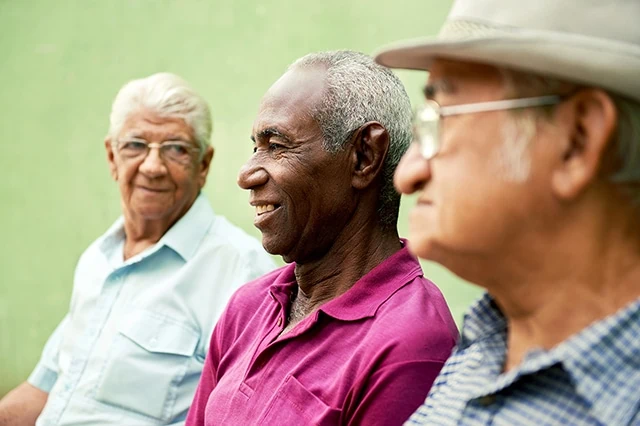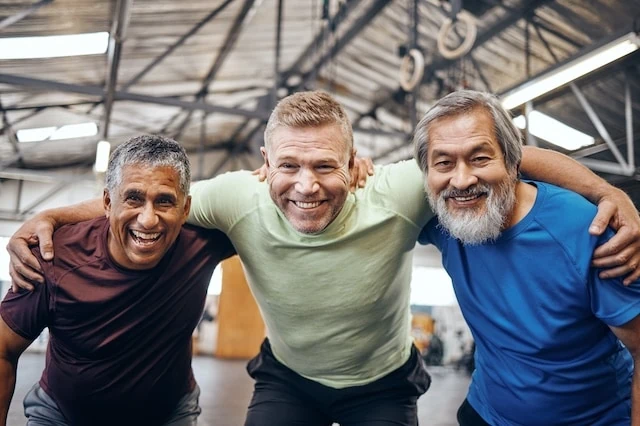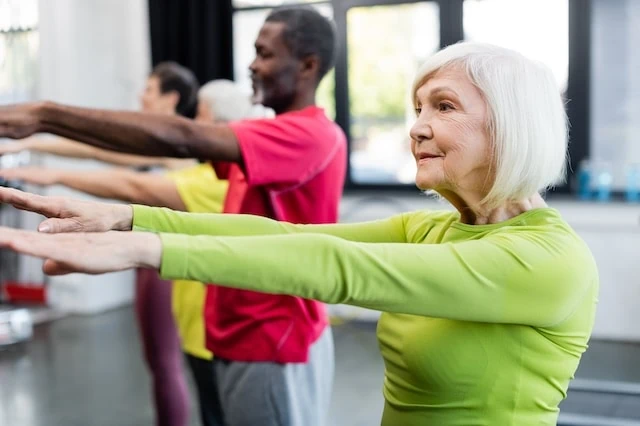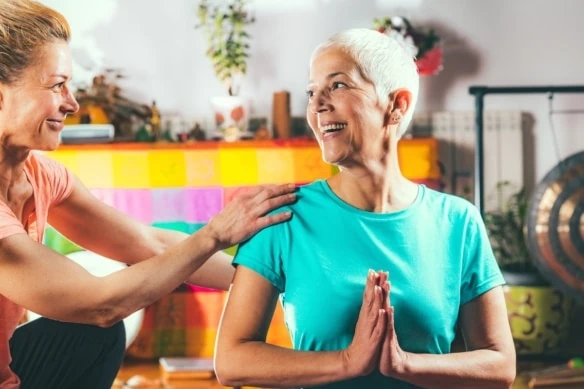Americans, on the whole, are getting much better about de-stigmatizing mental health disorders and seeking out help when it’s needed. Unfortunately, some older adults still struggle to prioritize and maintain their mental health.
“Despite the burden of mental health illness on older adults, they are unlikely to seek mental health help,” reads a 2023 paper published in the medical journal BMC Geriatrics. “The reluctance to seek formal mental health treatment can lead to adverse outcomes that can only result in the worsening of the individual’s mental health status.”
And it’s also common for elderly Americans to slowly stop doing the types of activities that are essential for their mental well-being.
While we wish it were otherwise, good mental health doesn’t just happen. You need to work at it. To maintain (or hopefully, improve) your mental health as you age, you’ll need to develop lasting habits. Let’s discuss some of the best ways older adults can maintain or improve their mental health.
Do Older Adults Have Poor Mental Health?

The state of mental health for older adults is … complex.
On the one hand, surveys frequently show that, overall, the elderly are the happiest of all age groups. In a 2022 AARP happiness survey, for example, the percentage of respondents who identified as “very happy” were as follows:
- Under age 40: 20%
- Ages 40 to 49: 16%
- Ages 50 to 59: 18%
- Ages 60 to 69: 21%
- Ages 70 to 79: 27%
- Age 80 and older: 34%
On the other hand, older adults tend to be at higher risk for developing mental health problems.
Approximately a quarter of adults aged 60 and older worldwide experience mental health issues, such as depression, anxiety, and dementia, according to the World Health Organization (WHO). The most common problems are depression and dementia, which affect between 5% to 7% of older adults.
And more troubling: Seniors over the age of 85 have the highest suicide rate of all age groups, followed by those between the ages of 75 and 84.
So while seniors might be happier than most as an age group, many within that group are at high risk for various mental health issues.
How Older Adults Can Improve Their Mental Health

Despite how it might seem, declining mental health doesn’t have to be an inevitable part of aging.
Whether you’re currently in a good place and just looking to maintain your mental health, or feel like it’s spiraling downwards and want to improve your mental well-being, there are many actions you can take.
1. Exercise

Exercise is No. 1 for a reason. There is a glut of evidence pointing to a strong connection between mental and physical health.
For instance, according to information published by the National Institute on Aging, exercise can help you sleep better, lower stress and anxiety levels, reduce feelings of depression, and possibly maintain or improve cognitive function.
How much exercise do you need? The World Health Organization recommends people age 65 and older do a minimum of 2.5 to 5 hours of moderate-intensity aerobic physical activity each week. It also suggests they do varied multicomponent physical activities focused on strength training and functional balance at least three days a week. Examples of these range from dancing to sports to even gardening.
But don’t think it’s all or nothing. Even small amounts of exercise can be beneficial. Build up your workout tolerance to a level that makes sense for you.
Related: 10 Things That Are Cheaper When You Retire
2. Spend Time Outdoors

There are several advantages for senior citizens who spend time outdoors.
Heather Eliassen, professor of nutrition and epidemiology at Harvard T.H. Chan School of Public Health, says spending time outside can lead to “improvements in sleep, blood pressure, cognitive function and physical activity, as well as reduced risks of chronic disease, such as type 2 diabetes, cardiovascular disease and cancer.” It can also improve mindfulness, as well as decrease stress and anxiety, she says.
Being outdoors can encourage exercise, too—which as I just said, is also beneficial to mental health.
Additionally, your skin’s ability to create vitamin D lowers with age; and people age 65 and older are particularly at risk for vitamin D deficiency—a condition linked to depression. One of the best ways to increase one’s vitamin D level is to simply spend time in the sun. (Just make sure you wear sunscreen; too much sun exposure without protection can increase your risk of developing skin cancer.)
Related: Best Schwab Retirement Funds for an IRA
3. Seek Treatment (And Second Opinions) When Necessary

It’s unfortunately common for medical professionals to dismiss some older adults’ mental health concerns as inevitabilities of aging. Don’t let them. Often, your concerns are valid and treatable. So if you think something is wrong, seek treatment—and if your worries are dismissed, consider getting a second opinion.
For example, elderly people have an increased risk of developing depression. This makes sense as depression is more prevalent among people with other illnesses, and elderly people are more likely to have one or more chronic conditions. However, depression itself is not a normal part of aging. If you are feeling signs of depression, such as a sense of hopelessness, loss of interest in hobbies, or suicidal thoughts, seek help and advocate for yourself to get proper assistance.
According to the National Council for Mental Wellbeing, around a million older adults in the United States suffer from substance abuse. Even though this age group is just as likely to benefit from treatment as their younger counterparts, they less commonly seek treatment. When they do, they are more likely to be misdiagnosed. It’s never too late to get help for a substance abuse problem. If you struggle with substance abuse, find treatment; it could greatly improve your quality of life.
Related: Best Fidelity Retirement Funds for a 401(k) Plan
4. Mindfulness Practices

Mindfulness is the ability to focus one’s attention on the present—but merely observing, not judging.
Research of middle-aged and older adults shows that those who have practiced mindfulness for 10 or more years perform better on tests evaluating attention, working memory, and processing speed than those who haven’t.
But you don’t need a decade’s worth of experience to enjoy a benefit. Additional research shows mindfulness, when practiced regularly, can improve cognitive function in as little as two months.
Mindfulness can also help lower levels of anxiety and depression. For depression, it can help people stay grounded and not dwell as much on negative past experiences or worry about the future. It can also keep you stable when intrusive thoughts try to pull you down a rabbit hole.
You can practice mindfulness through meditation, yoga, or tai chi.
Related: 8 Special Tax Breaks for Senior Citizens
5. Stay Social + Connected

Socialization isn’t just enjoyable—it can be important for a person’s health. Unfortunately, as we age, it can be more challenging to stay connected to others. Some older adults struggle to travel, might have lost some of their closest loved ones, or don’t have any obligations (such as employment) that provide them an automatic outlet to regularly interact with others.
The Cleveland Clinic states that chronic loneliness is associated with increased stress levels, which can cause a myriad of health problems, such as a weakened immune system, higher risk of cardiovascular issues, and memory problems.
In short: A lack of socialization affects both physical and mental health.
The solution? Frequently interact with others—and force yourself to if doing so doesn’t come naturally. You might visit a local senior citizen center, attend local concerts, or have weekly dinners or game nights with nearby friends or family.
Not all of your socialization needs to be in-person activities, though. You can also keep up with people through Facetime, Skype, and similar applications. Don’t let a fear of technology limit your interactions. These applications are straightforward to set up and use, but ask others for assistance if you need it.
Related: Want to Retire Early? Don’t Make These Mistakes
6. Stay Mentally Active

Just because you’re no longer in school or working doesn’t mean you should stop learning. Your learning capacity is still high as you age.
In 2023, associate professors Rachel Wu and Jessica A. Church wrote in Scientific American to describe their study of adults between ages 58 and 86. The adults took three weekly classes, each lasting two hours, to learn new skills. Their findings:
“Over the course of the intervention, people significantly improved their cognitive scores for memory and attention. In a follow-up study, we discovered that the participants had not only maintained their gains but had improved further: their cognitive abilities after one year were similar to those of adults 50 years younger. In other words, giving these seniors a supportive and structured three-course routine—much like an undergraduate student’s schedule—seemed to eventually improve their memory and attention to levels similar to that of a college student.
A 2021 AARP survey of adults ages 45 and older showed that 83% of respondents believe education is important for keeping one’s brain active. Those who keep learning clearly feel the benefits, as 97% of people who consider themselves current learners intend to continue learning.
Senior citizens who want a formal education can do so cheaply or even for free. Most states have at least one tuition-free state university program for older adults, and the ones that don’t have deeply discounted programs. But you don’t need to take formal classes to keep your brain sharp. You can also use free apps like Duolingo to learn a language, play online word games like Wordle, enjoy board games like chess, or read books.
Choose whichever learning activities you find most enjoyable. Your mental health will thank you.
Related: 12 AARP Discounts + Benefits You Don’t Want to Miss
7. Focus on Nutrition

Again, physical and mental health are deeply intertwined—and nutrition is part of that relationship.
Whether you’re getting adequate nutrition as a senior citizen affects your mental state. A study published online by the National Library of Medicine in 2022 found that older Americans with better diets have a reduced risk of developing disabilities that affect daily living and depression.
Every person’s body is unique, so the exact foods you should eat will vary, but there are a few key nutrition themes to keep in mind. The National Council on Aging provides the following healthy eating tips for older adults:
- Eat more whole foods and less processed foods
- Create meal plans in advance
- Drink enough water and eat water-rich foods
- Get sufficient protein to prevent muscle loss
- Eat fiber-rich foods
- Monitor your sodium intake
That said, while having a balanced diet might have gotten you all the nutrients you needed when you were younger, in older age, you might have to take some supplements. Discuss with a doctor any deficiencies you need to address.
And hey: Bonus points if you try to eat at least some of your meals with others, which will increase your socialization levels.
Related: Budgeting in Retirement: Our Step-by-Step Guide
8. Get Enough Sleep

As you age, you may find it more challenging to sleep. A person’s circadian rhythm (part of your body’s internal clock) changes when they get older, and health problems can affect sleep.
Difficult as it might be, though, it’s vital for senior citizens to get enough sleep—even if many people (mistakenly) believe older adults simply need less of it.
It’s commonly accepted that sleep issues are a symptom of depression. But some research hints that it can go in the other direction as well—disturbed sleep could also be a cause of depression. Some studies have also found a connection between sleep disturbances and a higher risk for dementia.
The Sleep Foundation recommends all adults should try to get a minimum of seven hours of sleep every night. To improve your chances of a good night’s rest, exercise regularly, get on a sleep schedule, and limit substances that harm sleep, such as alcohol, tobacco, and caffeine.
Related: 12 Senior Discounts That Will Save You Money
9. Laugh More

Laughter can help alleviate many of older adults’ struggles. According to the Mayo Clinic, some of laughter’s benefits include (but aren’t limited to):
- Stress relief
- Reduction of physical tension
- Organ stimulation
- Immune system improvements
- Pain relief
- Connections with others
- Reduced feelings of depression and anxiety
In other words: A good laugh can do wonders for your mental health.
But laughter is best as a natural response, rather than a forced action. So how can people add more laughter to their lives? The more often you’re around people, the more opportunities there are for someone to tell a silly story or for a funny situation to occur. You can actively seek comedy by going to stand-up shows or comical plays. If you’re more of a homebody, it’s as easy as looking through the “comedy” section of streaming services or listening to free podcasts.
Related: Retired But Too Young for Medicare? Health Insurance for Early Retirees
10. Volunteering

Believe it or not, when older adults find a cause they care about and volunteer for that cause, that can improve their mental health, too. Information published by the Mayo Clinic states that volunteering can lower rates of anxiety and depression, especially for seniors ages 65 and older.
But why?
Well, to start, volunteering can give people a sense of purpose and make them feel as if they are making a positive difference. Depending on the type of volunteerism, you might also learn a new skill, get exercise, or develop new relationships.
Not sure where to find volunteer opportunities? VolunteerMatch connects people to local organizations that need volunteers. There are virtual volunteer options as well. For example, you may be able to help a cause by translating documents or making phone calls.
Related:








